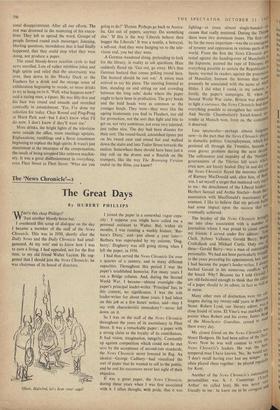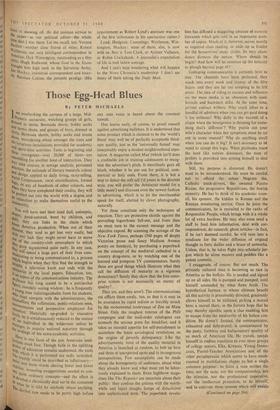The 'News Chronicle'-2
The Great Days
By HUBERT PHILLIPS WHO'S this chap Phillips?' 'Just another bloody-brass hat.' I overheard this scrap of dialogue on the day I became a member of the staff of the News Chronicle. This was in 1930, shortly after the Daily News and the Daily Chronicle had amal- gamated. At my wits' end to know how I was to earn a living, I had appealed, not for the first time, to my old friend Walter Layton. He sug- gested that I should join the News Chronicle; he was chairman of its board of directors.
'Okay, lialviird, let's hear your saga!'
I joined the paper in a somewhat vague capa- city : I suppose you might have called me a personal assistant to Walter. But, within six months, I was running a weekly feature, `Bar- bara's Diary,' and—just about a year later— Barbara was superseded by my column, Dog- berry.' Dogberry was still going strong when I left the paper, in 1956.
I had thus served the News Chronicle for over a quarter of a century, and in many different capacities. Throughout this period I was the paper's established humorist. For many years I ran a Bridge column. And, during the Second World War, I became—almost overnight—the paper's principal leader-writer. 'Principal' has, in this context, no significance. I was the sole leader-writer for about three years. I had taken on this job at a few hours' notice, and—may I say with characteristic immodesty?--never fell down on it.
So I was on the staff of the News Chronicle throughout the years of its ascendancy in Fleet Street. It was a remarkable paper : a paper with a strong claim to the loyalty of its contributors. It had vision, imagination, integrity. Constantly up against competition which could not be met save by the acceptance of second-rate standards, the News Chronicle never lowered its flag. An idealist—George Cadbury—had visualised the sort of paper that he wanted to sell to the public, and he and his successors never lost sight of their objective.
It was a great paper, the News Chronicle, during those years when I was first associated with it. I often thought, with pride, that it was SPECTATOR. OCTOBER 21. 1961 fighting—at times almost single-handed-01 causes that really mattered. During the Thirtid there were two dominant issues. The first—and by far the more important—was the re-emergence of tyranny and oppression in various parts of the world. From the first the News Chronicle Olt tested against the handing-over of Manchuria 0 the Japanese; panned the rape of Ethiopia; did everything possible to sustain the Republicans ° Spain; warned its readers against the pretensions of Mussolini; foresaw the horrors that watIlil presently be associated with the name of Ado' Hitler. I did what I could, in my column, tu fortify the paper's campaigns. If, when the, Second World War came, Britain was prepared to fight a outrance, the News Chronicle had done everything possible to strengthen her resolution' And Neville Chamberlain's knock-kneed Or render at Munich won, from us, the contuotell it deserved.
Less spectacular—perhaps almost forgotten now—is the part that the News Chronicle played in domeitic politics. Unemployment, which ha" persisted all through the Twenties, became all even graver problem during the next decode,: The callousness and stupidity of the 'National governments of the Thirties left scars which' even now, are barely healed. Day in and day °11„ the News Chronicle flayed the moronic attitude of Ramsay MacDonald and, after him, of Ball: win. I set myself a target that mattered very ollse to me: the detachment of the Liberal leaders'. Herbert Samuel and Archie Sinclair—from the association with MacDonald's reactionary g°st: ernment. I like to believe that my private bat"-, had some impact upon the success that eventually achieved. The heyday of the News Chronicle brooll me into close association with a number 4)4 journalists whom 1 was proud to count Olt my friends. I served under five editors: T°" Clark, Aylmer Valiance, Gerald Barry, B°bint Cruikshank and Michael Curtis. Only one these—Gerald Barry—was a man of outstandio personality. We had not been particularly friend,ig Ye in the years preceding his appointment, but, on 's I had become the paper's leader-writer, I alW3):b backed Gerald in his numerous conflicts the board. Why? Because (as I told Gerald) am old-fashioned enough to think that the ed,r,5 of a paper should be its editor, in fact as %%e" in name. Many other men of distinction were ntY roe leagues during my twenty-odd years in Bouvers Street. Robert Lynd, our literary editor, vells,he close friend of mine. El Vino's was markedly poorer when Robert and his crony, James B° et of the Manchester Guardian, ceased to tile there every day. My closest friend on the News Chronicle sy.try Stuart Hodgson. He had been editor of the 1/11tie News. Now he was well content to write b News Chronicle's leaders. He was the best' _, tempered man I have known. 'No,' he would aware 'I don't recall having ever lost my temPer' often played chess together: he played regtl'a for Kent. Another of the News Chronicle's outstarldil personalities was A. J. Cummings (.Ori:ry Arthur' we called him). He was never no friendly to me: he knew me to be arrogant 3" fond ut showing off. He did yeoman service to the p iper--as our political editor—the whole time that I was there. Let me recall, too, Vernon Daniel—another close friend of mine; Robert H'aithmaq, our, very intelligent correspondent in America; Dick Winnitigton, outstanding as a film critic; Hugh Redwood, whose God in the Slums br°u8,1t him high rank in the Salvation Army; Ian Mackay, industrial correspondent and essay- ist; Norman Collins, the juvenile prodigy. (His appointment as Robert Lynd's assistant was one of the first milestones in his spectacular career.) Lynd; Hodgson; Cummings; Waithman; Win- nington; Mackay : none of them, alas, is now with us. Nor is Tom Clark, or Aylmer Valiance, of Robin Cruikshank. A journalist's expectation of life is,well below average.
And l can't help wondering what will happen to the News Chronicle's readership. I don't see many of them taking the Daily Mail.



















































 Previous page
Previous page